Discourse Amid Division: The 2024 Student Policy Debate
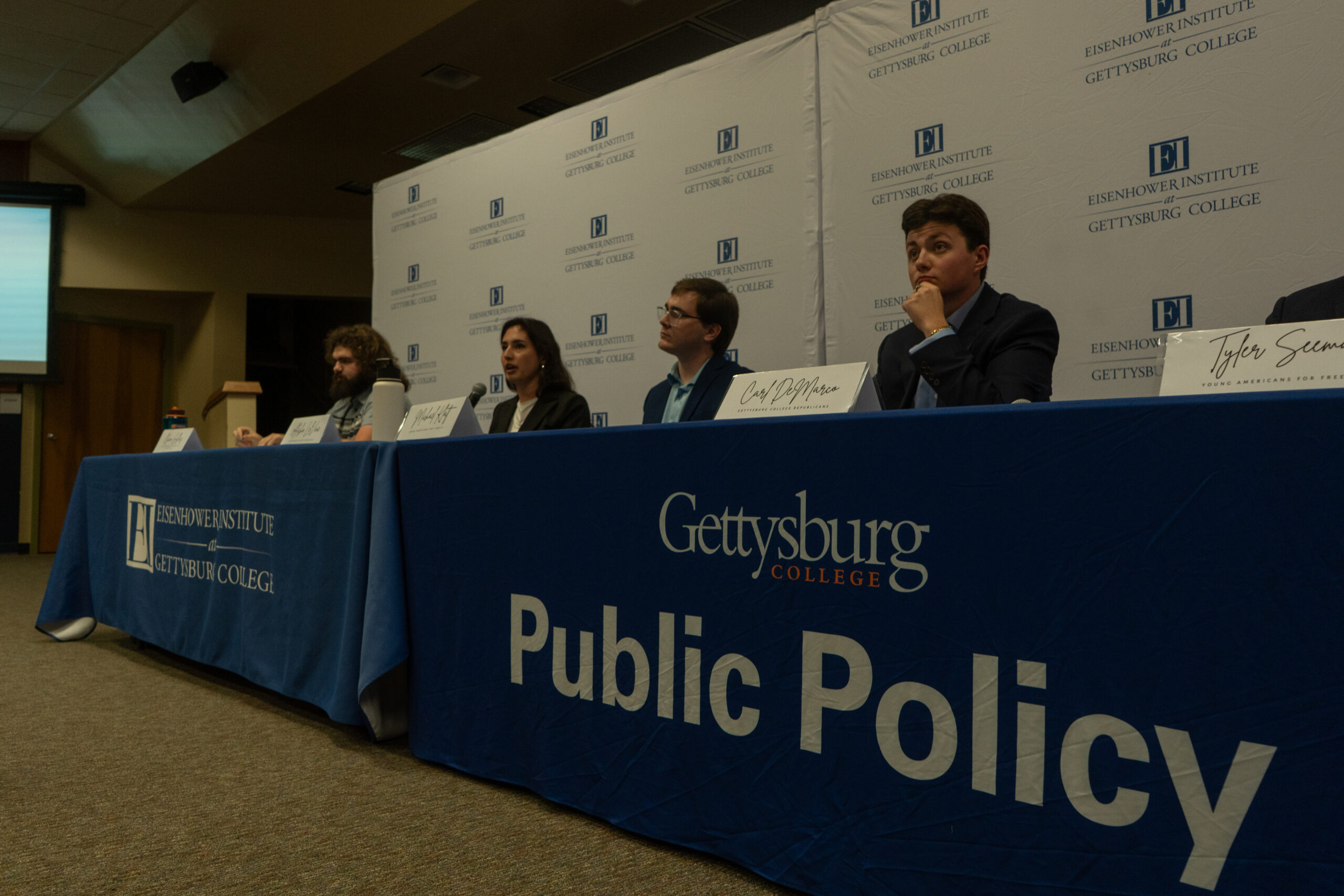
The annual student policy debate took place in Mara Auditorium on Wednesday, Oct. 23 at 6:30 p.m. (William Oehler/The Gettysburgian)
By Brandon Fey, News Editor
The 2024 Gettysburg College Policy Debate was held on Wednesday, Oct. 24 in Mara Auditorium. This annual event provides student political organizations with the opportunity to engage in formal debate over topical policy issues.
The debate was co-sponsored by the Eisenhower Institute, the Public Policy Student Council, Public Policy House, the new Conversations for Change initiative and the public policy department.
It followed a different structure from previous years as each organization was granted only one representative as opposed to the previous two.
The participants included Tyler Seeman ’26 representing Young Americans for Freedom, Carl DeMarco ’25 of the Gettysburg College Republicans, Michael Klatt ’25 from Young Americans for Liberty, Alisha LeVine ’25 with the Gettysburg College Democrats as well as Quinn Gillies ’25 speaking on behalf of Young Democratic Socialists of America.
The event was primed with an introduction from Public Policy Student Council co-chairs Juliette Rhinow ’25 and Rachel Herr ’26 who thanked the sponsors and introduced the event’s moderator, Eisenhower Institute Executive Director Tracie Potts.
Potts welcomed the attendees and introduced and introduced the debaters, question topics and general format for the evening. Each debater was allotted time to respond to the question which they did in a rotating order. The representatives would be given the opportunity to rebut a claim by another debater that specifically targeted either themselves or their respective organizations.
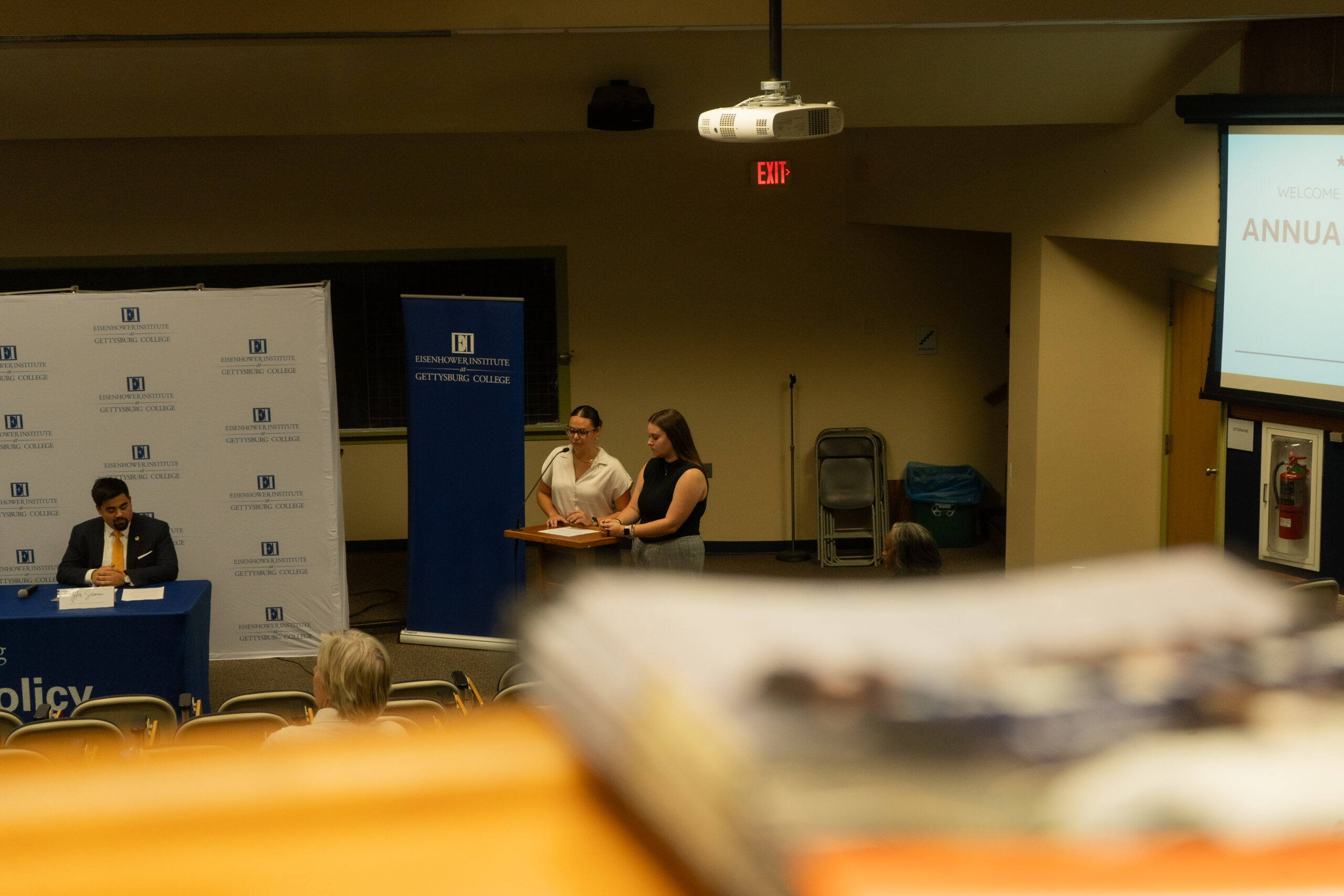
Public Policy Student Council co-chairs Juliette Rhinow ’25 and Rachel Herr ’26 introducing Tracie Potts. (William Oehler/The Gettysburgian)
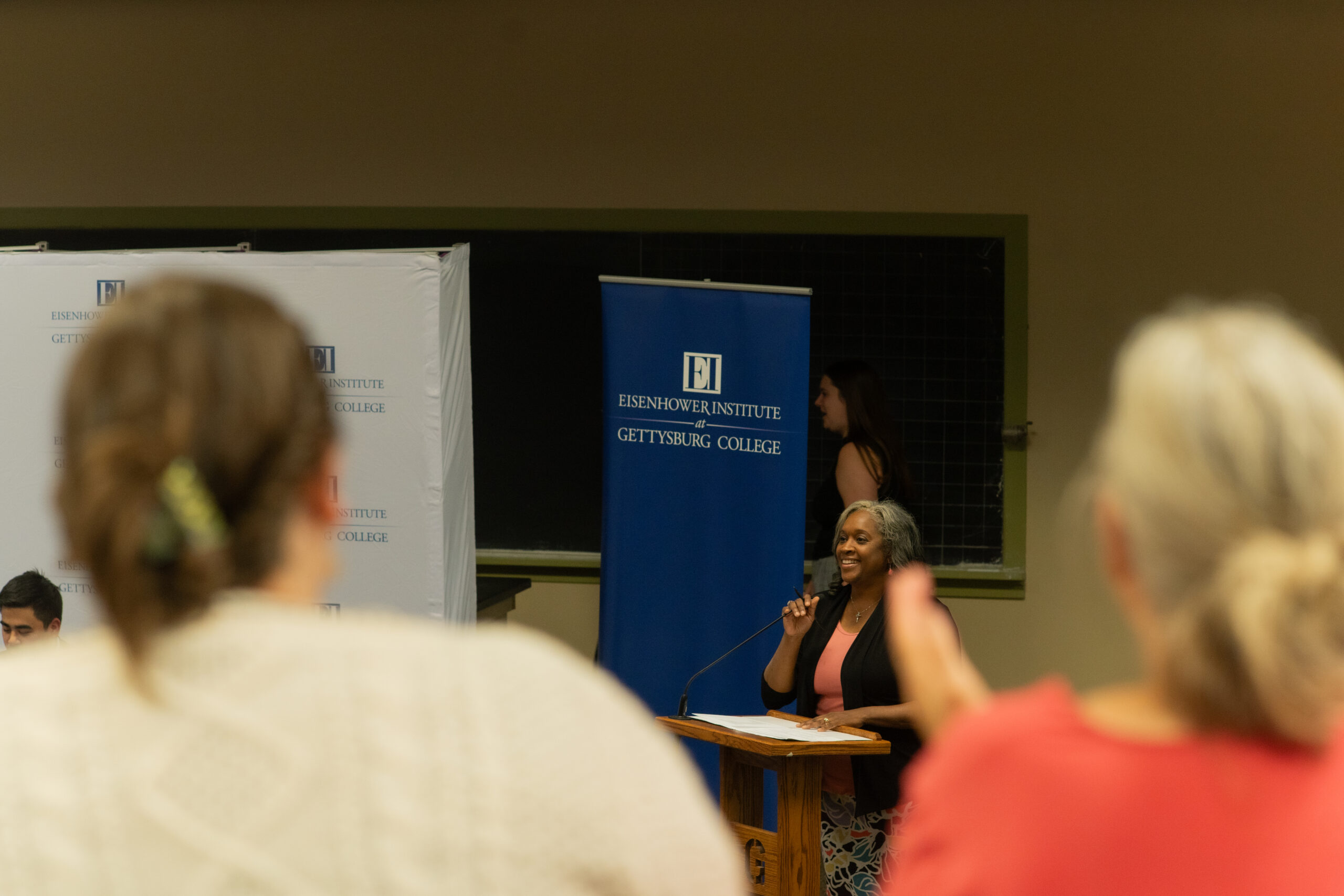
Eisenhower Institute Executive Director Tracie Potts moderated the 2024 student policy debate. (William Oehler/The Gettysburgian)
She described the debate as a prime example of the mission of the C4C initiative which strives to foster civil political discourse on campus. The debate began with opening statements.
The first was made by Tyler Seeman on behalf of YAF, in which he mentioned the organization’s conservative principles of individual freedom, strong national defense, free enterprise and traditional values.
DeMarco opened by acknowledging the impending presidential election. He emphasized that Republican candidate Donald Trump does not represent the values of his party or the campus chapter, arguing that the Republican Party is ideologically diverse.
Klatt’s statement began with a claim about political parties. “I want you to understand one fundamental truth of both major parties, neither of them care about you,” he said.
He followed his claim by asking the audience to consider the complacency of the partisan system, adding that both parties have failed to deliver upon their promises of social and economic development in the past. He offered the libertarian beliefs of YAL as an alternative as they emphasize the value of individual freedom for all people.
LeVine expressed the Democratic Party’s mission to address working-class social issues involving the economy, healthcare and climate change, among others. She mentioned her party’s priority of supporting Vice President Kamala Harris in her bid for the presidency, arguing that the election puts the state of democracy at stake.
Gillies of YDSA shared his organization’s vision of creating a socialist society in which democracy is expanded to the workplace as well as the dismantling of patriarchy, white supremacy and capitalism, which he listed as “systems of oppression.” He called for the general betterment of the working class and expressed his disappointment in the fact that the ongoing Israel-Hamas War, which he described as a “genocide,” was not among the listed topics of discussion for the debate.
DeMarco and LeVine were each granted a rebuttal to Klatt’s claim about their parties in which they asserted that their organizations do care about the American people and offered insights into the democratic process which they said can sometimes take time to operate.
The first question of the debate asked about the Pardon Project, which is a Pennsylvania initiative to expunge non-violent criminal records of individuals five years after they complete their sentence and parole. The representatives were asked if this should remain a state-level initiative or expand federally.
Gillies expressed support for the initiative’s expansion, describing a need for significant justice reform as he claimed that the system disproportionately affects minorities and the impoverished.
LeVine agreed, stating that the criminal justice system perpetuates cycles of poverty and limits the opportunities of those with criminal records.
Klatt also supported a federal expansion of the program and discussed mass incarceration in the United States.
DeMarco stated that he would support the project if decriminalization did not extend to white-collar criminals who, according to DeMarco, cause a substantial amount of harm to families and individuals despite being nonviolent.
Seeman concurred with DeMarco in terms of supporting the project exclusive of white-collar criminals. He then provided examples through which he argued that presidential pardons have succeeded in fostering unity.
The next question asked if the federal government should implement a carbon tax as its primary tool against climate change.
LeVine supported a carbon tax as a market-based approach to reduce carbon emissions. She also discussed creating a cap and dividend system to return the tax revenue to communities in the form of rebates.
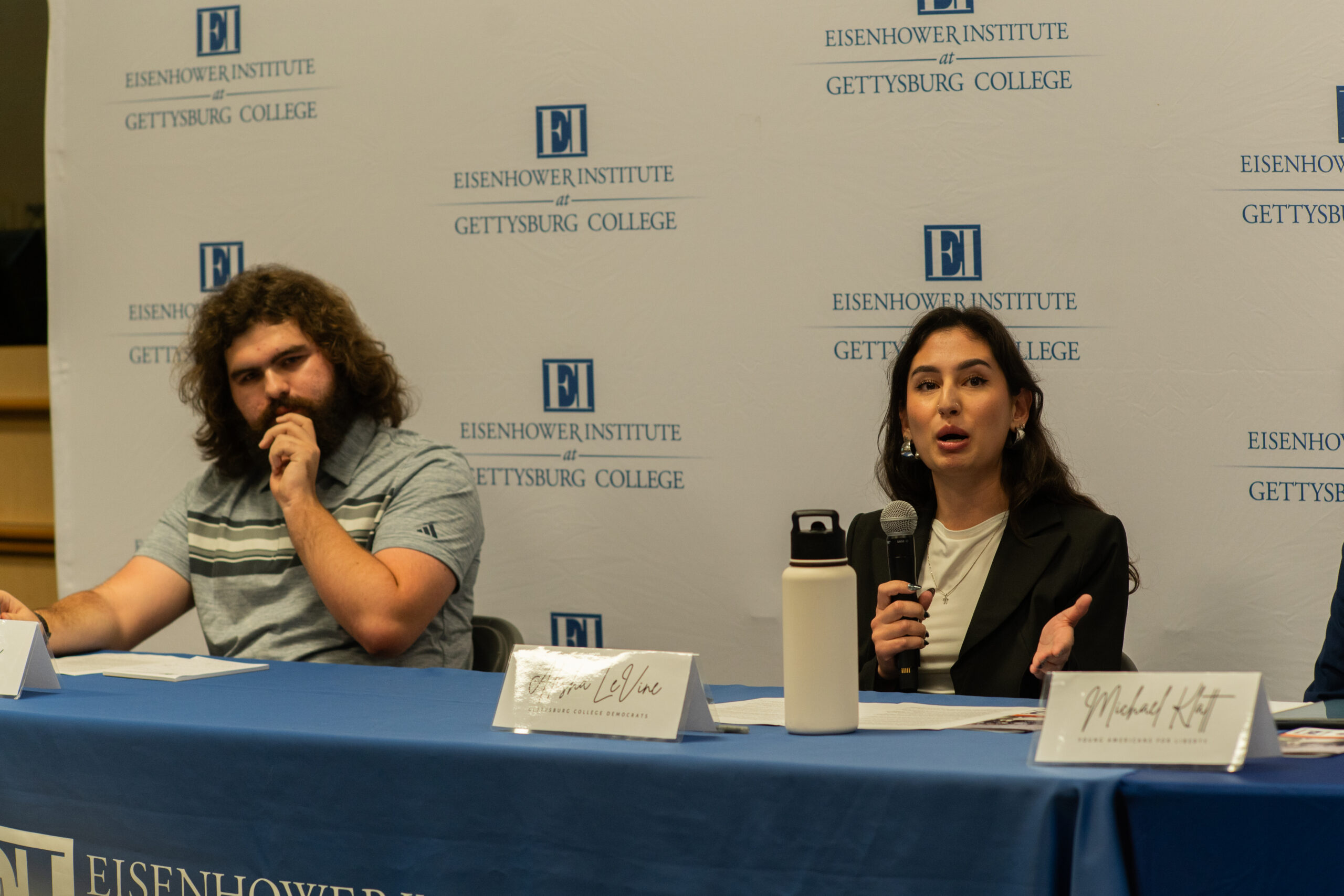
President of College Democrats Alisha LeVine ’25 responds to a question during the debate. (William Oehler/The Gettysburgian)
Klatt asked the audience to consider where the rate for such a tax would be set, stating that the social cost of carbon is indeterminable. He proposed that instead of a federal carbon tax, a cap and trade system to address the negative externalities of carbon dioxide emissions more effectively.
DeMarco opposed the implementation of a federal carbon tax, citing the consequences of a similar tax in Canada, which he said involved an increased burden of middle-class households and has been the source of unprecedented political opposition. He called instead for subsidies for those who pursue proactive green initiatives.
Seeman shared his objection to the tax, arguing that it would create greater economic issues by increasing inflation across all sectors. He also discussed the failure of similar efforts in Canada.
Gillies stated that the tax should be implemented federally, though not as the main tool for combating climate change. He said that greater government control of the energy sector is essential for eating green policies. He also said that funding social programs will counteract the burden on the people impacted by the tax.
The next question asked the debaters if tariffs and sanctions provide an effective means for the United States to assert its geopolitical influence.
Klatt expressed his opposition to tariffs, arguing that they domestic costs of production which likewise increases the cost of living for most Americans.
DeMarco followed by acknowledging that while his party was traditionally a proponent of tariffs, he believes that they are ineffective in achieving their goals. He did support the use of sanctions as a method of non-military coercion, claiming that they can be particularly effective when enacted against individuals.
Seeman referenced YAF’s foundational Sharon Statement which warned of the harm caused by government interference in a market economy as he argued that tariffs should only be implemented nominally if at all. He did, however, describe sanctions as a necessary means through which the United States should counter Chinese attacks on American intellectual property.
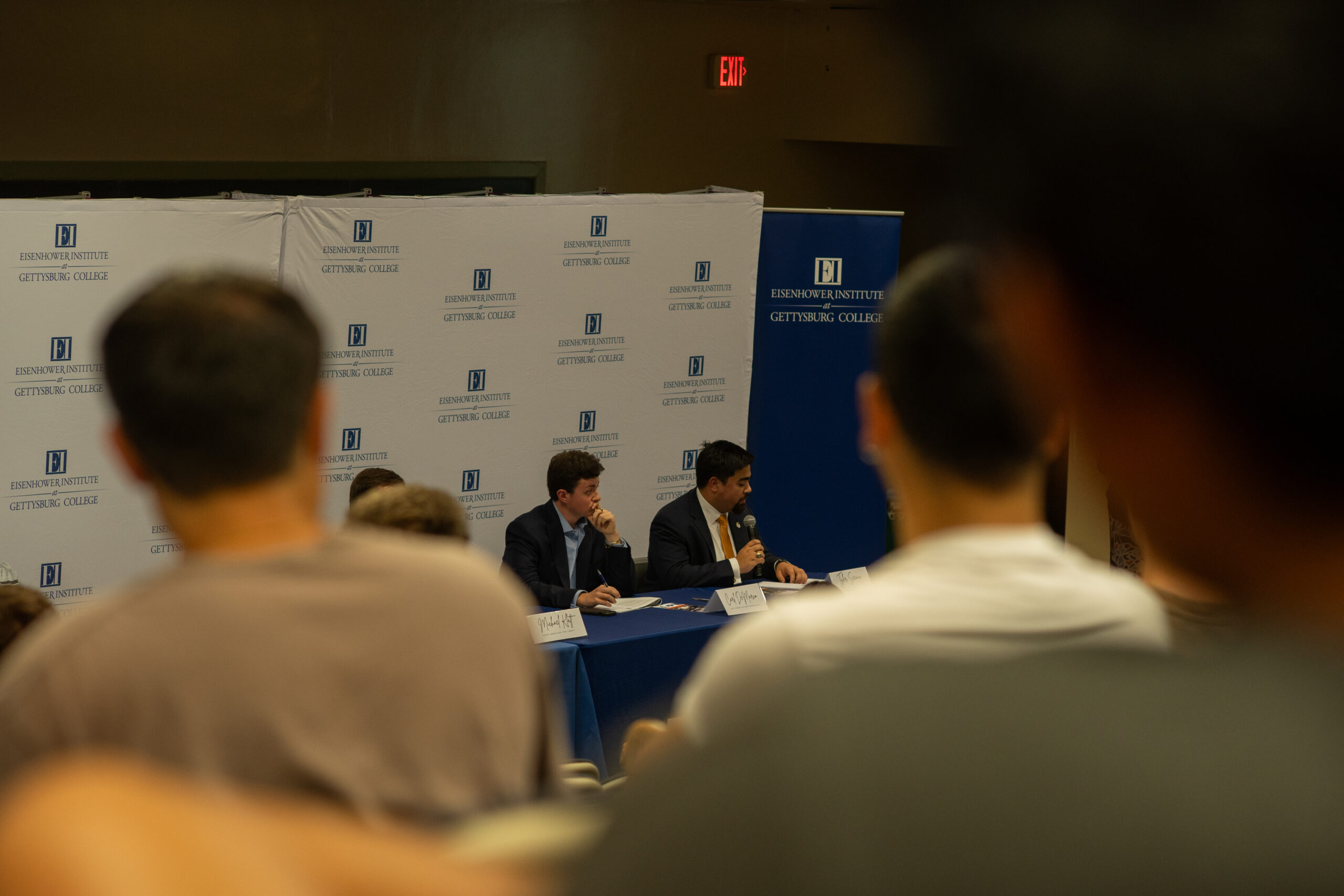
President of Young Americans for Freedom Tyler Seeman ’26 responds to a question during the debate. (William Oehler/The Gettysburgian)
Gillies held that neither tariffs nor sanctions are effective. He stated that tariffs are only effective for small countries and would distance the U.S. from the world economy it ought to be leading. He also used Russia as an example for his claim that sanctions are largely ineffective and ultimately impact the target country’s general population.
LeVine stated that tariffs would result in raised prices during a time of existing inflation. She suggested that a proactive approach would be more effective, saying, “We should start subsidizing certain manufacturing industries to allow them to be competitive, such as was done through the CHIPS and Science Act.” She agreed with Gillies on the ineffectiveness of sanctions, citing Russia and Iran as examples where they are proving futile.
The following question asked if state governments should award school choice vouchers for students to attend religious private schools and if doing so would be a violation of the separation of church and state.
DeMarco answered this question by sharing a quote from Pennsylvania State Senator Anthony Williams about how families should not be forced to send their children to failing schools that are unsafe due to their socioeconomic status. According to DeMarco, “School choice is paramount for the future of our country. To succeed, our children deserve an education that will not only prepare them for the future but help prepare us and help us grow as a nation.”
Seeman discussed the benefit he had gained from having attended a parochial school, and proposed a solution that involved restructuring the taxes that pay for the public schools, to support schools in their local districts while not eliminating federal funding to lower-income areas.
Gillies spoke about structural issues of public schooling, emphasizing a lack of funding and increasing segregation, both of which he attributed to limited revenue from property taxes as a result of redlining. He called for increased, more targeting funding to improve public school systems.
LeVine discussed her personal switch from a public to private religious schooling stating that the transfer would not have been necessary had she received greater “support” from the school system. She discussed the importance of having an effective public school system and claimed that religious education vouchers would divert much needed funding away from these public schools. She instead proposed increased teacher salaries and the provision of tutoring and social services as well.
Klatt took a different approach in which he discussed the importance of the separation of church and state in education, discussing examples of states placing Christian messaging in public schools. He stated his belief that families ought to be able to make their own decisions about where they send their children for schooling. “It ultimately should be up to the individual,” he said.
Klatt also introduced the concept of “backpack funding” as he argued that funding is more effective if targeted toward students as opposed to institutions.
The debaters also answered questions on in vitro fertilization and immigration and asylum before they switched to questions from the audience regarding abortion, the war between Israel and Palestine, ranked-choice voting, Donald Trump’s comment about the “enemy within,” the death penalty, student voting registration and climate change.
Potts concluded the event with closing remarks about debate, applauding these debaters for making the evening information and presenting their arguments civility.
“This is the essence of what the Conversations for Change initiative and the Eisenhower Institute are trying to do,” she said. “We want to listen to each other. We want to hear different perspectives, and then have an opportunity to digest those with the nuances we learn through discourse which we took the time to do tonight.”
